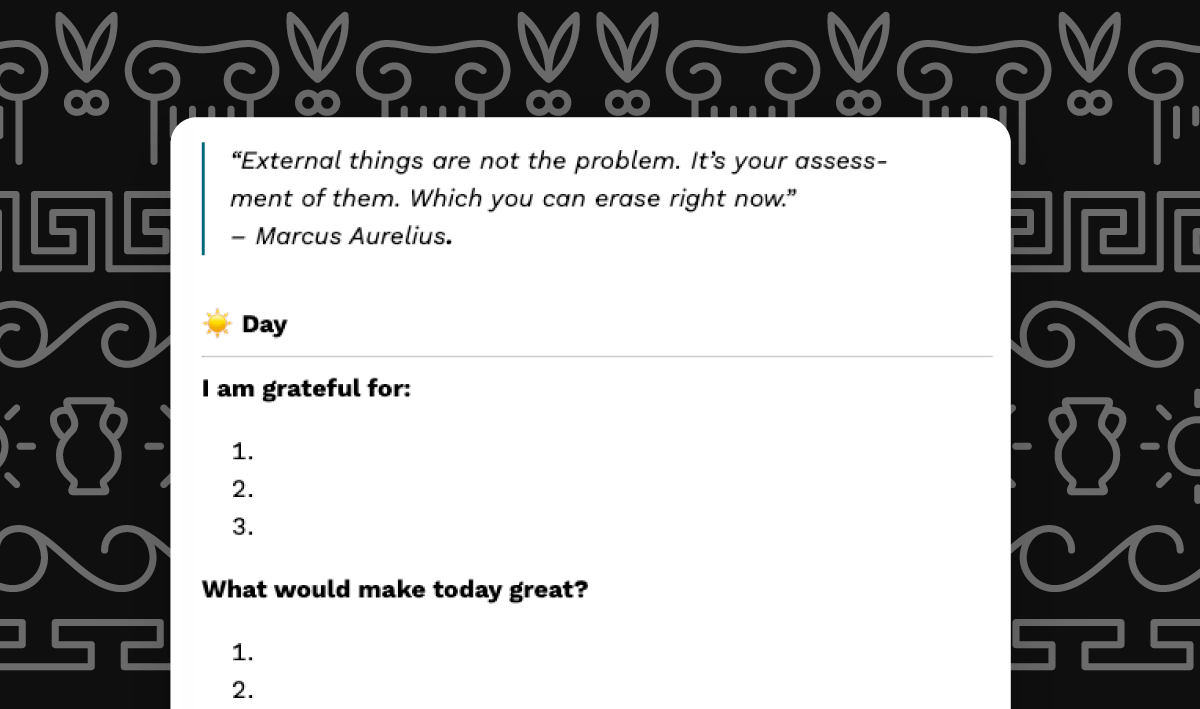50 Stoic Journaling Prompts Examples
Stoic philosophies largely revolve around embracing challenges, cultivating virtues, and finding inner peace. Using Stoicism to guide your journaling can help you develop wisdom, virtue, and unwavering commitment. Read on to find out more about Stoicism, and some helpful journaling prompts!

In a world filled with challenges and uncertainties, the teachings of Stoicism offer a guiding light to navigate life's complexities with grace and inner strength.
Stoicism has transcended time to offer profound insights into leading a fulfilling and purpose-driven life. Rooted in ancient philosophy, Stoicism provides a practical framework for navigating the complexities of existence with resilience, wisdom, and inner tranquility. One powerful tool within the Stoic toolkit is journaling, specifically through the use of Stoic journaling prompts.
Stoic journaling prompts can unlock a deeper understanding of yourself, cultivate virtues, and empower you to embrace life's ups and downs with unwavering equanimity.
Read on to find out more about the profound philosophy of Stoicism and explore the transformative power of using Stoic journaling prompts.
What is Stoicism?
Stoicism is a philosophical school of thought that originated in ancient Greece around the 3rd century BC and has since gained enduring relevance. At its core, Stoicism offers a practical and ethical framework for living a virtuous and fulfilling life. It teaches individuals how to cultivate inner strength, wisdom, and emotional resilience in the face of life's challenges.
Photo by Tingey Injury Law Firm / Unsplash
Stoics believe in focusing on what is within their control, accepting what is not, and practicing self-control, resilience, and moral virtue to navigate life's challenges with equanimity. The philosophy emphasizes detachment from external outcomes, embracing hardship as an opportunity for growth, and maintaining an unwavering commitment to living in accordance with reason and ethics.
Most central to Stoicism is the distinction between what is within our control and what lies beyond it. Stoics advocate focusing our energies on things we can control—our thoughts, actions, and attitudes—while accepting external events and circumstances with equanimity. This perspective helps individuals reduce unnecessary worry and anxiety by channeling their efforts towards constructive endeavors.
Moreover, Stoicism encourages a mindful engagement with the present moment, emphasizing gratitude for what one has rather than longing for what is absent. This perspective fosters contentment and a deeper appreciation for life's simple pleasures.
Stoicism's enduring appeal lies in its pragmatic approach to living a good life. It provides individuals with timeless tools to navigate the complexities of existence, fostering resilience, wisdom, and an ethical compass. By embracing Stoic principles, individuals can cultivate a sense of purpose, face challenges with courage, and nurture a well-balanced and virtuous character.
What are Stoic journal prompts?
Stoic journal prompts are thought-provoking questions or statements designed to encourage introspection, self-awareness, and the application of Stoic philosophy principles in everyday life. Rooted in the teachings of Stoicism, these prompts guide individuals in reflecting on their thoughts, behaviors, and emotions through the lens of Stoic virtues and principles.
Photo by 愚木混株 cdd20 / Unsplash
By engaging with Stoic prompts, individuals can cultivate resilience, self-discipline, and a deeper understanding of themselves and the world around them. The prompts often revolve around themes such as acceptance of what is beyond one's control, gratitude, virtue cultivation, and embracing challenges as opportunities for growth.
Stoic Journal Prompts For Self-Reflection
Stoic journaling prompts encourage introspection, prompting individuals to reflect on their thoughts, emotions, and actions. This self-awareness allows for a deeper understanding of personal strengths and areas for improvement.
If you have been wondering about engaging with this school of thought through your journaling, Journey’s “Daily Stoic Journal” template would be the perfect place for you to start. Use this template and Stoicism's "GGBBR" format to reflect in the day and at night. In the day, you can practice gratitude by listing a few things that you’re grateful for and some daily affirmations. In the night, you can reflect on how you day turned out, think back to the good things that happened that day, and also reflect on how you could have done better. You can also include a different Stoic quote into your template everyday as well. This way, you can start and end your day with meaningful reflection.

- What thoughts or emotions have been dominating my mind lately? How have they affected my daily life and relationships?
- What am I placing too much importance on that is beyond my control? How can I refocus my attention on the things I can control?
- Reflect on a challenging situation from the past. How did I react initially, and how could I have responded differently from a Stoic perspective?
- How am I actively or passively seeking external validation or approval? How can I shift my focus to internal validation and self-acceptance?
- What negative beliefs or limiting mindsets am I holding onto? How can I reframe them to align with Stoic principles and cultivate a more positive perspective?
- Reflect on a recent setback or failure. How can I embrace it as an opportunity for growth, learning, and resilience?
- What external events or circumstances have I allowed to disturb my inner peace? How can I practice detachment and maintain equanimity in the face of adversity?
- What is one area of my life where I can practice voluntary discomfort or self-discipline? How might this contribute to my character development and inner strength?
- Reflect on recent interactions or conflicts with others. How can I practice empathy, understanding, and forgiveness in those situations?
Stoic Journal Prompts For Mindfulness
Photo by Callum Shaw / Unsplash
"Until we have begun to go without them, we fail to realize how unnecessary many things are. We've been using them not because we needed them but because we had them." - Seneca
Engaging with Stoic journaling prompts fosters mindfulness by directing attention to the present moment and one's reactions to it. This mindfulness helps individuals respond to challenges with clarity and composure.
- Describe a simple daily activity that you often take for granted (such as eating, walking, or breathing) and reflect on the gratitude you can cultivate for that activity.
- Pay close attention to the sensations in your body as you engage in a specific activity (like washing your hands or drinking a cup of tea). Write about the physical experience without judgment or analysis.
- Explore the concept of impermanence by reflecting on the transient nature of your thoughts, emotions, and experiences throughout the day. How does this awareness impact your perspective?
- Practice "sitting in observation" by spending a few minutes each day simply observing your thoughts and emotions without getting caught up in them. Write about any insights or patterns that arise.
- Engage in a daily "gratitude journal" where you reflect on three things you are thankful for, however small or mundane they may seem. How does this practice shift your mindset?
- Pay attention to the present moment by choosing a specific activity or task and fully immersing yourself in it. Write about how it feels to engage with that activity with full presence and focus.
- Cultivate awareness of your breath throughout the day. Write about the sensations and benefits you observe from intentionally practicing deep, mindful breathing.
Stoic Journal Prompts To Manage Emotions
Photo by Lesly Juarez / Unsplash
"The greatest weapon against stress is our ability to choose one thought over another." - William James
While this quote is not from a traditional Stoic philosopher, it captures the essence of Stoic teachings on emotional regulation. Stoic philosophy emphasizes the power of our thoughts and rationality in shaping our emotional responses. By choosing to focus on rational and constructive thoughts, we can effectively manage and regulate our emotions, aligning with Stoic principles of maintaining inner tranquility and equanimity in the face of challenges.
Stoic journaling prompts guide individuals in managing their emotions effectively. By examining their emotional responses and considering Stoic perspectives, individuals can learn to respond to situations with equanimity and avoid impulsive reactions.
- Reflect on a recent situation that triggered a strong emotional response. What underlying desires or attachments were responsible for the intensity of the emotion? How can you detach from those desires and cultivate a more balanced perspective?
- Write about a past event or situation that you still find emotionally difficult to accept or let go of. How can you reframe your perspective on this event using Stoic principles such as accepting the things beyond your control and focusing on your own actions and choices?
- Reflect on the emotions of anger or resentment that arise when someone wrongs you. How can you apply the Stoic virtue of forgiveness and understanding to manage and transform these emotions?
- Examine a recurring negative emotion you often experience (such as fear, jealousy, or envy). How can you use virtue ethics to cultivate its corresponding positive counterpart (e.g., courage, contentment, or kindness)?
Stoic Journal Prompts For Virtue Cultivation
"The good man is the man who no human being is able to injure or offend; he is also the man who does the right thing at the right time and in the right way." - Epictetus
Stoic journaling prompts focus on cultivating virtues such as wisdom, courage, justice, and temperance. Regular engagement with these prompts helps individuals align their actions with these virtues, leading to personal growth and moral integrity.
- Reflect on a recent situation where you demonstrated a Stoic virtue (such as courage, wisdom, or self-control). Describe the situation and how it aligns with Stoic principles.
- Choose a virtuous quality you would like to cultivate within yourself (such as patience or gratitude). Write about specific actions or practices you can engage in to develop that virtue.
- Reflect on a recent situation where you acted in a way that was not aligned with your desired virtues. How could you have responded differently, and what lessons can you learn from that experience?
- Reflect on a person you admire for their virtuous qualities. What specific virtues do they embody, and how can you learn from their example to cultivate those virtues within yourself?
- Choose a specific virtue and write about the challenges or obstacles you face in embodying that virtue. How can you overcome those challenges and continue to practice and develop that virtue?
- Reflect on a situation where you acted virtuously despite facing temptations or external pressures. How did practicing virtue contribute to your own sense of integrity and self-worth? What were the positive outcomes of that virtuous action?
- Write about a virtue you struggle with or find difficult to embody consistently. Explore the possible reasons for this struggle and brainstorm strategies or practices that could help you strengthen that virtue.
- Reflect on a past event where you acted in accordance with a specific Stoic virtue. How did this virtuous action positively impact your own well-being and the well-being of others?
- Consider the relationships in your life and how the cultivation of specific virtues (such as compassion, patience, or forgiveness) can strengthen those relationships. Reflect on how you can actively cultivate these virtues in your interactions with others.
Stoic Journal Prompts For Resilience
"The art of living is more like wrestling than dancing, because an artful life requires being prepared to meet and withstand sudden and unexpected attacks." - Marcus Aurelius
Stoicism emphasizes embracing challenges as opportunities for growth. By journaling about obstacles and applying Stoic principles, individuals can develop resilience and transform adversity into valuable experiences.
- Reflect on a difficult or challenging situation you have faced in the past. How did you navigate through it, and what lessons did you learn about the importance of resilience?
- Write about a current obstacle or setback that you are facing. How can you apply Stoic principles such as accepting the situation, focusing on what you can control, and maintaining a resilient mindset to overcome this challenge?
- Explore the concept of "amor fati" or "love of fate." How can you cultivate an attitude of embracing and accepting all outcomes, both positive and negative, as opportunities for growth and resilience?
- Reflect on a time when you faced failure or criticism. How did you respond, and how can you cultivate a more resilient mindset to bounce back from such experiences in the future?
- Consider the Stoic practice of negative visualization, where you imagine and mentally prepare for worst-case scenarios. How can this practice enhance your resilience by reducing fear and anxiety about potential hardships?
- Reflect on a time when you experienced adversity and emerged stronger as a result. What specific strengths or virtues did you develop through that experience, and how can you amplify those strengths in future challenges?
Stoic Journal Prompts For Gratitude
Photo by Stephanie Klepacki / Unsplash
"He is a wise man who does not grieve for the things which he has not, but rejoices for those which he has." - Epictetus
Many Stoic journaling prompts center around gratitude and appreciation for life's blessings. Regularly acknowledging and reflecting on what one is grateful for can promote a positive outlook and greater contentment.
- Reflect on three things you are grateful for today, no matter how small or seemingly insignificant they may be.
- Write about a recent experience or interaction that you are grateful for. How did it positively impact your life or contribute to your well-being?
- Reflect on a challenging situation or setback you have faced recently. How can you find gratitude in the lessons learned or the personal growth that resulted from that experience?
- Write a letter expressing gratitude to someone who has had a positive impact on your life. Detail the specific ways in which they have made a difference and how their actions or presence bring you gratitude.
- Reflect on the beauty of the natural world around you. Write about specific elements of nature that you appreciate and feel grateful for.
- Take a moment to pause and reflect on your own personal strengths, talents, and qualities. Write about why you are grateful for these unique attributes and how they have positively influenced your life.
- Consider the challenges or difficulties you have faced in life. Reflect on the lessons you have learned from these experiences and the gratitude you feel for the resilience, growth, and wisdom they have brought you.
Stoic Journal Prompts For Shift in Perspective
Photo by Nathan Dumlao / Unsplash
"Man is affected not by events but by the view he takes of them." - Epictetus
Stoic journaling prompts encourage individuals to reframe situations, viewing them from a Stoic perspective. This shift in viewpoint can help individuals detach from unnecessary worries and focus on what is truly within their control.
- Reflect on a situation that is causing you distress or frustration. How would a Stoic philosopher approach this situation, and how can you shift your perspective to align more closely with Stoic principles?
- Write about a current challenge or setback you are facing. How can you reframe this situation as an opportunity for growth, learning, or practicing virtues such as patience or resilience?
- Reflect on a past event or situation that you have been holding onto with resentment or regret. How can you reinterpret this event from a Stoic perspective, focusing on acceptance, forgiveness, and moving forward?
- Write about a desire or attachment that is causing you suffering or disappointment. How can you shift your perspective by recognizing the impermanence of external circumstances and focusing on internal values and virtues instead?
- Consider the concept of "memento mori" or the contemplation of death. How can reflecting on the inevitability of mortality help you shift your perspective on the present moment, prioritize what truly matters, and appreciate the preciousness of life?
Stoic Journal Prompts For Personal Development
"Do not indulge in dreams of having what you have not, but reckon up the chief of the blessings you do possess, and then thankfully remember how you would crave for them if they were not yours." - Marcus Aurelius
By consistently engaging with Stoic journaling prompts, individuals can work on their personal development, becoming more virtuous, self-aware, and capable of navigating life's challenges with resilience and grace.
- Reflect on a virtue or quality you would like to develop within yourself (such as patience, courage, or mindfulness). Write about specific actions or practices you can engage in to cultivate and strengthen that aspect of your character.
- Write about a limiting belief or negative thought pattern that is holding you back from personal growth. How can you challenge and reframe this belief from a Stoic perspective to empower yourself and foster personal development?
- Reflect on a recent mistake or failure. What lessons or insights can you extract from this experience, and how can you apply them to your personal development journey?
- Write about a goal or aspiration you have for your personal growth. Identify the specific steps or actions you need to take to make progress towards that goal and commit to a plan of action.
- Reflect on your daily habits and routines. How are they contributing to or hindering your personal development? Identify one habit that you can cultivate or eliminate to enhance your progress towards becoming the best version of yourself.
The Stoics' teachings, with their emphasis on embracing challenges, cultivating virtues, and finding inner peace, continue to resonate across time. By integrating Stoic principles into our lives through reflective journaling, we embark on a journey of self-discovery, growth, and resilience.
As we navigate the complexities of the modern world, let Stoicism's timeless wisdom and the power of journaling prompts guide us toward a life characterized by wisdom, virtue, and an unwavering commitment to living in alignment with our true selves. Through each journal entry, we are not merely writing words on paper, but crafting a blueprint for a life well-lived—a life that embraces both the joys and adversities with grace, wisdom, and Stoic equanimity.
Download Journey today for stoic journaling.












